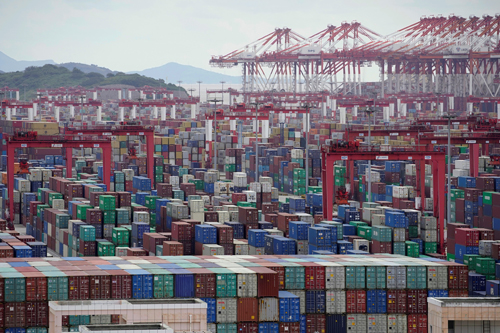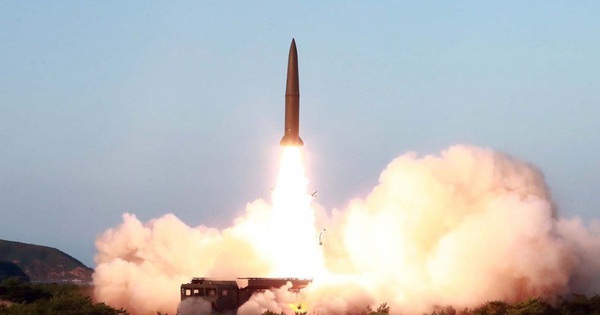Global inflation “ghost”
The recent Chinese lockdowns pose a greater risk to global inflation now than in 2020 as the world is already more reliant on Chinese goods, analysts at Bernstein Research said. country since the beginning of the Covid-19 pandemic.
The risk of recession increases
China’s share of global exports has grown to 15.4% in 2021 – the highest level since 2012. China’s exports have surged over the past two years as the country brought the outbreak under control. Initial outbreak within weeks and continued production while the rest of the world struggled to contain the Covid-19 epidemic.
However, now China is facing a bad wave of the epidemic, and foreign business leaders describe the closure and travel restrictions as harsher than in early 2020.
According to Reuters, the “epidemic” Shanghai has recorded more than 300,000 Covid-19 cases since March. In an effort to minimize the economic impact, the Shanghai government is gradually easing strict epidemic prevention measures after many complainants cannot buy food. However, most businesses here are still closed.
The AP news agency quoted data from Gavekal Dragonomics Research Company, showing that 83 of the 100 largest Chinese cities in terms of economic output are applying epidemic prevention measures, including manufacturing hubs such as Guangzhou and Xuzhou. , Thai Nguyen… Also according to the radio CNNInvestment Bank Nomura statistics at least 44 Chinese cities are under complete or partial blockade.

Containers at Yangshan deep-water port in Shanghai, China. Photo: REUTERS
After Chinese President Xi Jinping emphasized his determination to pursue a “no Covid-19” strategy on April 13, experts Ting Lu, Jing Wang and Harrison Zhang at Nomura Financial Group (Japan) warned The risk of China falling into a recession is increasing.
“The logistics crisis is getting worse. Markets are also concerned about the disruption of spring planting in China,” the experts said. This scenario could contribute to pushing global food prices – already at record highs because of the conflict between Russia and Ukraine – even higher.
The report by analysts at Bernstein shows that compared to pre-pandemic, export container costs in Shanghai are 5 times higher and air freight rates are 2 times, and put a strain on delivery times of China. supplier.
The Bernstein report predicts higher export inflation, especially to China’s major trading partners, while delaying the recovery of China’s own demand.
Unusual in America?
Central banks in the Asia-Pacific region find it impossible to ignore the “ghost” of inflation after the period of monetary policy easing that helped post-pandemic economic recovery. According to the radio Al Jazeerathe Central Bank of Korea and the Reserve Bank of New Zealand have begun tightening monetary policy when announcing rate hikes this week.
The Monetary Authority of Singapore has followed suit, while central banks in emerging Asian economies such as the Philippines, Malaysia and India have signaled that interest rates will be raised soon.
In the US, according to radio NPRmore and more economists predict a recession is at risk of hitting the US within the next 2 years, as the US Federal Reserve (FED) prepares to sharply raise interest rates to combat inflation. highest in more than 40 years.
That seems to be an unusual forecast given that the US economy still seems to be stabilizing with nearly 6.5 million jobs created in the past 12 months, bringing the unemployment rate to just 3.6%. But it is the strong economy and hot labor market that will push inflation above the Fed’s 2% target.
NPR Citing economist Matthew Luzzetti, the Fed has no choice but to raise interest rates significantly higher and that in itself will lead to at least a mild recession by the end of next year.
Earlier, Bank of America chief investment strategist Michael Harnett also warned of a “recession shock” as consumer prices rose 8.5% in March – the fastest pace since January. December 1981.
However, there are also opinions that the Fed can still control inflation without causing a recession. CNN cited analysis from investment bank Goldman Sachs (USA) that economic growth must drop to a “modest pace below trend”, enough for companies to reduce some expansion plans, thereby The demand for labor is less hot and the recession trend is prevented.
Warning from President Putin
Page Business Insider quoted Russian President Vladimir Putin as saying on television before a meeting with the Russian oil industry on April 14: “A reasonable alternative to Europe simply does not exist. There is simply no inventory. available on the global market, and goods from other countries, including the US, if they reach Europe, the price will be many times higher.”
The Kremlin boss said that the economic consequences would be severe if the continent tried to replace oil and gas supplies from Russia. Also according to President Putin, Russia will continue to redirect energy exports to fast-growing markets in Asia, according to Al-Jazeera radio.
Responding to the statement of the Russian president, the European Commission (EC) warned European Union countries will violate sanctions if they accept the “ultimatum” on payment of energy costs in rubles. . According to the EC, doing so would give Russia complete control over transactions and exchange rates.
For his part, German Minister of Economy and Climate Change Robert Habeck on April 15 called on Germans to start saving energy to become more independent from Russian energy, and affirmed a 10% reduction. energy consumption is quite possible.
at Blogtuan.info – Source: nld.com.vn – Read the original article here



